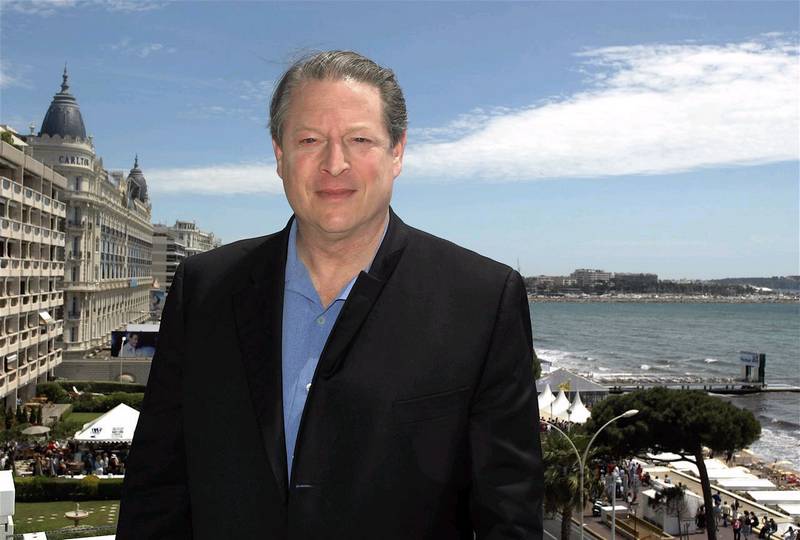When there is a new outrage, I have to download some of my existing outrages, to make room. — Al Gore
CANNES, France — What he wants you to know is that he has not made a political film. Al Gore‘s “An Inconvenient Truth” tries to move outside politics and focus on the facts of global warming. Gore says those facts are established, the returns are in, there is almost unanimous scientific agreement about them, and we may have about 10 years before the earth reaches a tipping point from which it cannot recover.
He has been traveling the world for six years making speeches in which this message has evolved. But all of those speeches put together have not had the impact of this new documentary, directed by Davis Guggenheim, which is horrifying, enthralling and has the potential, I believe, to actually change public policy and begin a process which could save the earth.
It is not only an important film, but a good one. Guggenheim has found a way to make facts and statistics into drama and passion. He organizes Gore’s arguments into visuals that overwhelm us. Gore begins with the famous photograph “Earthrise,” which was the first photo taken of Earth from outer space. Then he shows later satellite photos. It is absolutely clear that the white areas are disappearing, that snow and ice is melting, that the shape of continents is changing. The polar areas and Greenland are shrinking, lakes have disappeared, the snows of Kilimanjaro have vanished, and the mountain reveals its naked summit to the sky for the first time in human history.
You owe it to yourself to see this film. If that sounds overdramatic, I understand. I could not have imagined writing that before seeing the film myself. “An Inconvenient Truth” is not Al Gore‘s “opinion,” or anyone’s “political position,” but a report on a process that the world’s environmental scientists — almost literally every single one of them — are in agreement about.
Al Gore sits in a hotel room at the Cannes Film Festival and talks about these things. His film received a standing ovation here, but lots of films do. What’s extraordinary is what an impact it has had. People are talking about it in that particular tone of voice that indicates they were moved beyond all their expectations. It opened Friday in New York and Los Angeles, and this Friday in Chicago and many other major cities. It will then roll out across the country, building (Gore hopes) on word of mouth, on people telling each other they must see it.
Gore makes no mention in the film of President George W. Bush or any of his policies. He deliberately avoids naming any names or pointing any fingers. “This is not a political movie,” he said firmly. “Paramount did a lot of focus groups, and people came out said it was not like “Fahrenheit 9/11.” It played fair and supported what it said. It appealed equally to Republicans and Democrats, liberals and conservatives. You have to remember that the environment used to be a bipartisan issue in the United States. Religious leaders saw it as a matter of respecting God’s creation.”
In the film, Gore is shown as a man with a mission. Other retired politicians go into business or the media or teaching. Gore has devoted his life to the issue of global warming.
“The other day,” he said, “I saw a TV ad, which is being run to try to neutralize this film. It’s sponsored by an industry front group underwritten largely by Exxon Mobil. They have a line in the ad: ‘CO2. They call it pollution. We call it life.’
“Honest,” he said. “This is a real ad. I know it sounds like a spoof from ‘Saturday Night Live.’ It’s funny, and we laugh, but the energy industry has paralyzed America for 20 years with disinformation like that. They’re using exactly the same strategy the tobacco industry used. They’re saying there is a ‘controversy,’ and they refer to a ‘debate’ when in fact the scientific consensus on global warming is definitive.
“We found an internal memo from an energy industry group from 1998, written by their disinformation specialists, saying their objective was: ‘Reposition global warming as theory rather than fact.’ That’s the same language that tobacco used. The easiest defense is to simply deny reality, and claim the truth is not the truth. Otherwise, they have to admit there is a moral imperative for change, and that would offend their big supporters in the oil and energy industries.”
Gore says this, and behind him through the hotel window the sun shines down on Cannes and people make deals and go to movies and the world looks much as it always has. Then you go to his movie and discover that they drilled into the polar ice to extract an ice core that’s a 650,000-year record of global climatic trends, and the current situation is going off the charts. There is no precedent. You learn that hurricanes in the Gulf and typhoons in the Pacific have suddenly escalated in frequency and strength. That rainfall patterns are being disrupted. That Arctic melting is having an effect on the Gulf Stream. That the 10 hottest years in history have been in the last 14 years. That the number of days annually the Arctic tundra has been frozen enough to support trucks has gone down from 225 to 75.
“There is as strong a consensus on this issue as science has ever had,” Gore said. “A survey of more than 928 scientific papers in respected journals shows 100 percent agreement. But a database search of newspapers and magazines shows 57 percent of the articles question global warming, and 43 percent accept it. That’s disinformation at work.
“Even in the short run,” he said, “we aren’t heeding the warnings. Two or three days before Hurricane Katrina, the National Weather Service predicted a hurricane so severe it would create ‘medieval conditions’ in New Orleans. It issued clear warnings that the levees might be breached and the city flooded. Yet look what happened, and how slow the response was. Hurricane season starts again in a week.”
I asked him: “How do you feel about Bush’s position on global warming?” — since his film never mentions the president’s name and refers to him only indirectly, when Gore introduces himself: “I used to be the next president of the United States.”
Gore shrugged. “There was a big new official study last month that said global warming is real and human activity is largely responsible. The White House, quote, ‘accepted the study without endorsing its conclusions.’ A White House spokesman said, ‘This is only the first of 21 studies.’ That sounds good until you realize it is also the latest of hundreds of studies.
“The danger,” he said, “is that people will go from denial to despair without stopping in between to ask themselves what action they can take.”
In the movie, Gore suggests some actions, like switching to higher-mileage and hybrid cars, developing and supporting clean energy sources, and even something as simple as turning off the lights.
“The leading scientists say we have about 10 years. After that, we reach the tipping point, the point of no return. That doesn’t mean the world ends, but it means that civilization as we know it gradually becomes impossible, more quickly than we can imagine.
“Is it too late? Look at the hole in the ozone layer. Everybody got together on that after the Montreal Accord, and the hole has grown a lot smaller, and will have disappeared by the year 2050. So that worked. No, it’s not too late. But it’s too late to be sitting around.”
This interview was last Sunday.
On Monday, an Associated Press story began:
Is President Bush likely to see Al Gore‘s documentary about global warming?
“Doubt it,” Bush said coolly.












